edited by David Steffen and Ziv Wities
I keep my head low as I sprint towards the floating Kakardemon, dodging left-and-right across the dusty ground of Io. A ball of lightning crackles overhead, a near-miss, and the Kakardemon’s single green eye twists in fury, its red leather skin sparking in the twilight as it builds another attack. But I’m Energy Power, Queen of New Hell, I’m too damn fast and I get what I want: I leap forward with the Knife of Taertus held high and stab it into the Kakardemon’s brow. I’m nearly thrown off as the floating ball of hate starts bucking beneath me, but I grab one of its curved horns and hold on tight.
The Kakardemon sinks to the rocky canyon floor with a hiss. I step away, leaving the knife buried up to its carved-ivory hilt and grabbing the pump-action shotgun from my back. I cock it, and the sound echoes from sulfurous walls stretching half a mile high.
No other threats on my wristscreen minimap, players or monsters. Clear for now.
The demon’s huge eye, half as big as the round body it’s set in, focuses on me. Its fanged mouth opens, acid drooling out and fizzing where it lands. A deep rumble echoes up from unknowable dimensions and coalesces into a voice reverberating with the screams of a thousand swallowed victims. It speaks unto me:
“Knife of Taertus has restored Kakardemon’s soul. Kakardemon can now talk, and will ally with—”
“Yeah, yeah, shut up, you’re not my first. Look: there’s this boy.”
“Give Kakardemon a player name to access performance statistics and—”
“I already wipe the floor with him every which way from Sunday, I don’t need help there. That’s kind of the problem, to be honest.” Tick tock, time to move, before someone zeroes in on my location. I sprint out of the canyon and towards the Security Tower. The tower is a needle in the heart of New Hell, a white plasteel obelisk stretching from the plains of Io towards Jupiter above; that great planet looms like a baleful orange eye in the ink-black night, its great storm a malignant red pupil. Demonic sigils blaze crimson round the tower’s crown, and my skull thrums with the subsonic resonance of their magic.
The Kakardemon bobs along behind me like a puppy. Sort of. An eight-foot-floating-demonic-ball-of-hate-and-blood-with-one-eye-and-spiky-horns puppy.
“If Energy Power can be specific with her problem, Kakardemon can offer many techniques refined in combat pits on the shores of hell.”
“My boyfriend won’t talk to me anymore.”
Demonboy Ballsack stops at this. Not the usual request, I’ll grant him. “Kakardemon has no context for romantic guidance.”
“Don’t worry, Johnny One-Eye, I don’t need your dating advice.” I kick the door of the Security Tower open: a six-foot demon’s standing just inside, and its face splits vertically in a drool-laden screech. I cut it off with a shotgun blast in the mouth, jumping over the corpse as it hits the floor with a gratuitous surge of blood. “We—Edge94 and me—we’ve been going out for a few months now. Just online, y’know—in-game chat and emails and kicking eight shades of ass in co-op tournaments—but we were going to meet in meatspace next month. He was all set to drive down for a day, but I went past him on the leaderboard last week and he’s been in a sulk since.”
“Kakardemon remains uncertain how to offer support for Energy Power’s love life.”
“What is it they promise in the adverts? ‘AI powered by an advanced neural network for analysis of player thought patterns’, something like that right? So I need you to tell me how to lose to him without it looking obvious. Show me how other people end up losing to him so I can copy that convincingly. If he’s above me in the rankings again maybe he’ll stop being such an asshole about this.”
We’re coming up on the temple room, a huge open square of sandstone pillars and lava pits, so I switch to the chaingun. The Kakardemon falls into a brooding silence as I mow down the advancing hordes of demons that pour from portals to flood this cursed moon. I’m bouncing between raised carbon-steel platforms, not even looking where I’m landing, flying by instinct with my chaingun spitting fury. The walls reverberate with screams and gunfire, and my whole world is concentrated down to the spinning geometry of circle-strafing.
“Kakardemon’s analysis of Energy Power’s player profile suggests this is not a stable long-term solution to your problem.”
“You what?” I switch to the rocket launcher and fire at my feet as I jump, surfing the shockwave to fly across the room and escape a group of demons, their claws clattering as they reach for my legs and grasp only air. I twist in mid-air and fire again, simultaneously accelerating myself towards the far platform and exploding the tightly-clustered demons into a glorious shower of chunky kibbles.
“Energy Power does not hold back,” says the Kakardemon. “Energy Power is most satisfied when giving her all. Attempts to gain happiness by self-limiting achievements are doomed to failure in Kakardemon’s opinion.”
“How’s any of this helping me, la Papa Diabla?” I punch a secret panel in the wall and grab the armour upgrade from the hidden alcove, juicing my power armour beyond its normal limits. It glows a deep shade of blood red I’ve always been fond of.
“Purpose of Kakardemon’s intelligence is to maximise player’s happiness. Kakardemon anticipates Energy Power will grow steadily resentful of the necessity to perform sub-optimally in order to soothe Edge94’s ego, leading to the inevitable breakdown of the relationship and greater hurt to both parties. Kakardemon does not want this. Kakardemon wants Energy Power to be happy.”
“But I want Edge94 to be happy. He’s the first… look, my parents are never really about, and VR nerds aren’t exactly the most popular ticket in town. Edge94 is the only real friend I’ve got, as well as everything else. I miss talking to him, and I miss him being happy, and I wish I knew why he cared so much about the fucking leaderboard.”
“Analysis of Edge94’s playtime pattern and ranking history suggests his skill at the game forms a large part of his self-identity. Kakardemon also notes that high levels of in-game communication between Energy Power and Edge94 began after Edge94 had achieved the top ranking. Kakardemon therefore deduces Edge94 believes Energy Power only likes him for his skill, and that Energy Power’s higher rank will inevitably lead to a decline in her desire for him.”
It takes a moment to work through all that in my head. I’ve never heard a Kakardemon talk so in-depth. But shit, this is all because his ego means more to him than I do? “That stupid S.O.B.! Why won’t he just talk to me about it?”
“Kakardemon has noted male players often interpret the need to communicate as a weakness, and that in order to solve their problems they should instead ‘git gud’. Kakardemon has also noted the ineffectiveness of this tactic, and has frequently exploited it.”
“Ugh! You’re giving me problems without solutions, Kakarmama. Just tell me what I gotta do.”
“Kakardemon suggests signalling your desire to talk.”
“Tried that. He starts shooting before I can get a word in.” The last of the invading demons drops dead, smoke rising from a dozen holes in its torso. The temple altar in the central lava pit cracks open, and a column rises through it from underground: there’s a Kyberdevil perched on top, an ugly-ass nine-foot goat-legged little bitch with most of its torso carved away to attach a rocket launcher. I say hello with a cluster of precisely timed frag grenades.
“Kakardemon concludes Energy Power needs a delay. Tactical resource banks suggest that surprise is the best way to force this.”
The Kyberdevil’s already on its knees, stunned by the frags. I hop over and finish it with a boot to the head, crunching through its skull to the squishy grey stuff beneath. “A surprise like what?”
“Kakardemon sometimes rolls around on floor singing classic pop song ‘Independent Woman’ while other demons flank the player.”
That brings me up short. “Huh. No shit. Didn’t know you could get down like that. Don’t reckon it’ll work for me, though, I’m not round enough to roll. I need something else.”
“Kakardemon suggests Energy Power think quick. Edge94 is closing on this position.”
Shiiiit. I check the minimap and spot him below me. He must’ve already blazed through the armoury on sub-level one. He’ll be kitted out now, definitely a plasma rifle, maybe a BMF gun if he got lucky. He could oneshot me. I’ll have no time to line up a shoulder shot to disarm him, no time to throw down my guns, no time to get a “Hey” out on local chat. He’ll kill me and—and shit, if I’m honest, Old Red Testicle here is right. I won’t be happy losing. Edge’ll kill me and I’ll get pissed at him and come back hard, and then he’ll come back harder at me and—well, then I’ll kill him again cos I’m better, and he’ll get in an even bigger sulk and we’ll never get anywhere. I need to get him to talk to me.
So I need a surprise. Something he’s not expecting. Something where he can’t hit me before I’m done.
I look at the Kakardemon. At the knife still sticking out its head, the ivory hilt contrasted against the red leather skin.
“Well, buddy,” I say. “It’s been good chatting. Good luck out there.” I yank the knife from its head and stamp down on the central platform switch. I drop out of sight beneath the closing altar just as the Kakardemon snarls, its electronic facsimile of a soul vanished and gone.
I’m running before the column’s finished its drop into the catacombs. It’s thick with darkness down here, but I know Edge94 is close and I can’t be caught standing still. I could beat him to the quick-draw easy, circle-strafe round him in my sleep, but this? This shit’s gonna be hard.
My wristscreen vibrates with a silent proximity alarm. I back up against a stone wall, facing a staircase lit with flickering candles. Edge’ll expect me to run up there, get to the mezzanine floor above, where I could drop grenades on his head. He’ll be facing it already, waiting to shoot me in the back.
But he won’t expect me to spin like this, whirl the other way and crouch-jump through the window here, come at him from the other side with the Knife of Taertus in my hand, zig-zagging through the dark and headed straight for him. I’m Energy Power, the too-damn-fast Queen of New Hell, and I—get—what—I—want. A huge ball of green plasma flies past me to one side and then I’m on him, bearing him down to the ground, and the knife’s in his chest and he’s staring in shock.
“What the hell?” he says, pinned beneath me as I straddle his torso.
“Gotcha.” I flick the knife hilt with one finger.
“You know the knife only works on AI, right, not humans? It can’t make me talk.”
I raise an eyebrow.
“Well, I mean, I know I’m talking now, but… well. Shit. Alright.”
“Alright yourself. We need to talk.”
He looks at the knife in his chest, and he looks up at me, and he sighs in defeat.
I’m Energy Power, and I get what I want.
© 2021 by Matt Dovey
1900 words
Author’s Note: I grew up on my PC. Well, first I grew up on my Amiga 500, but by the time I was hitting adolescence I was knee deep in Duke Nukem 3D, Quake, Monkey Island, Red Alert, Grand Theft Auto (in 2D!) and so on. This story is, therefore, the purest expression of my id I have yet written. It is full of stupid little references for no other reason than it amuses me, probably more than I even realise–and the entire thing is a reference to the British magazine Edge, who in 1994 famously concluded their review of the original Doom with “If only you could talk to these creatures…”That it grew from a stupid videogames in-joke into a commentary on toxic masculinity and the self-defeating futility of female-presenting people limiting themselves to be acceptable to society and the weak men in their life was, perhaps, inevitable.

Matt Dovey is very tall, very English, and most likely drinking a cup of tea right now. He has a scar on his arm he claims is from fighting Kyberdemons, though in truth he just walked into a tree with a VR helmet on. He now lives in a quiet market town in rural England with his wife & three children, and despite being a writer he still hasn’t found the right words to fully express the delight he finds in this wonderful arrangement. His surname rhymes with “Dopey” but any other similarities to the dwarf are purely coincidental. He’s an associate editor at PodCastle, a member of Codex and Villa Diodati, and has fiction out and forthcoming all over the place, including all four Escape Artists podcasts, Analog and Daily SF. You can keep up with it all at mattdovey.com, or find him timewasting on Twitter as @mattdoveywriter.
If you enjoyed the story you might also want to visit our Support Page, or read the other story offerings.



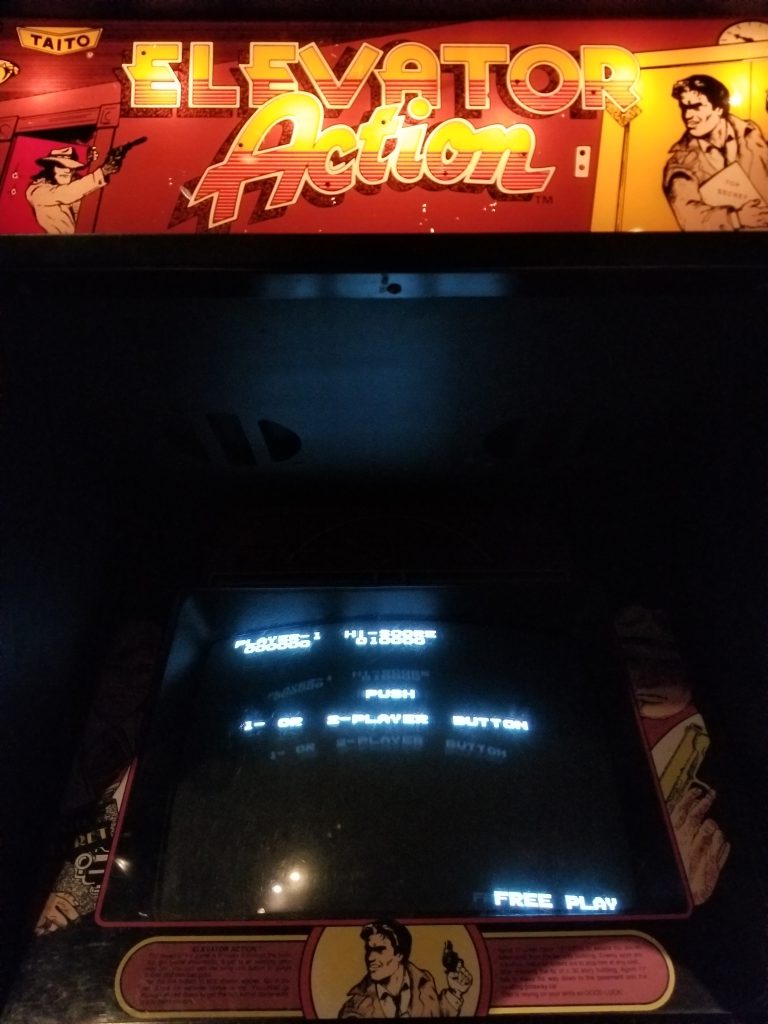
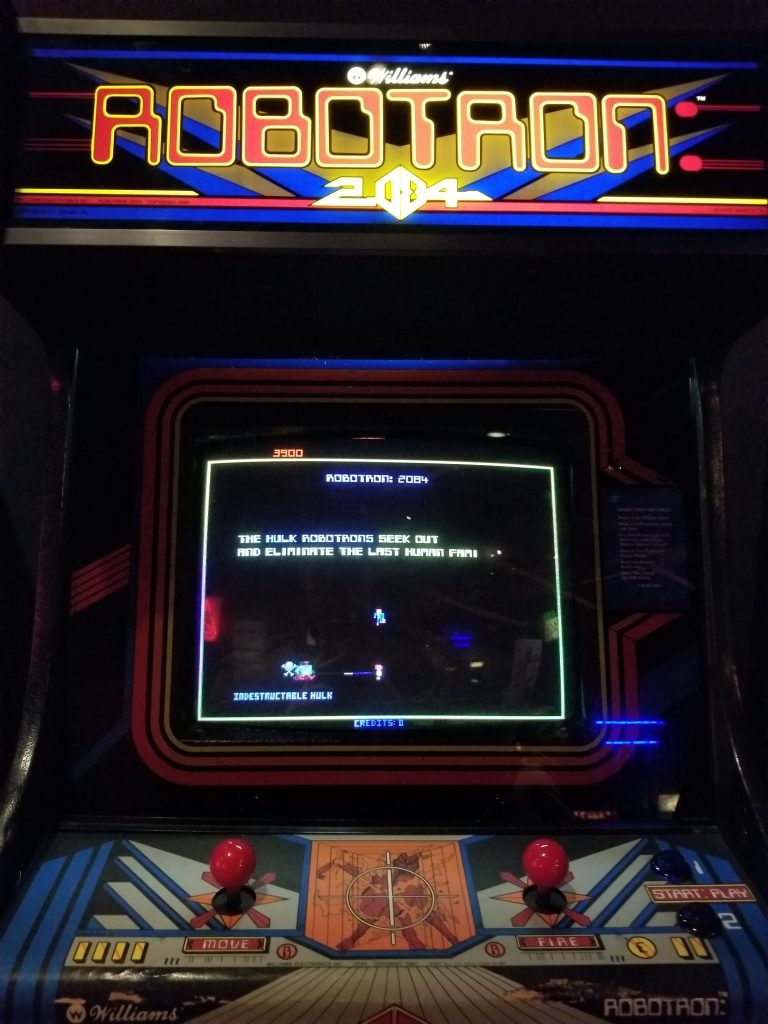
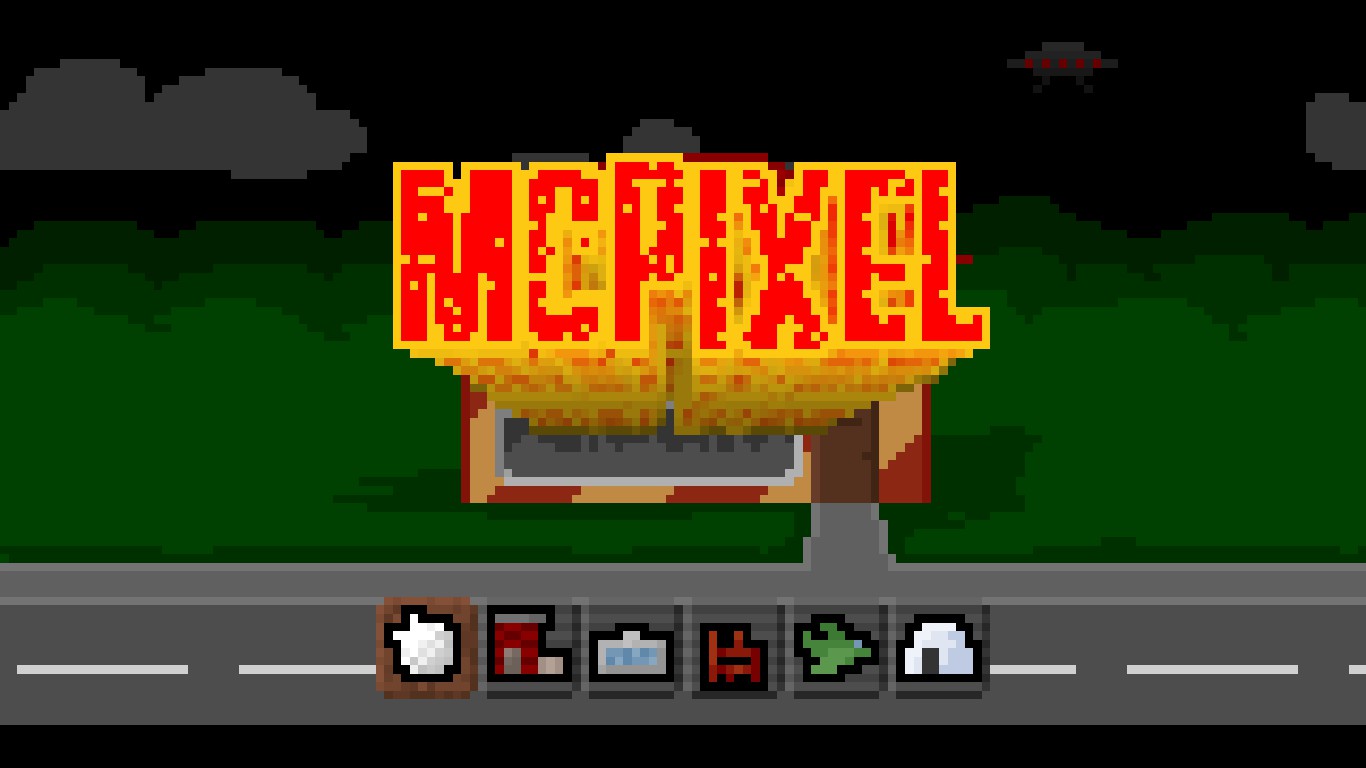
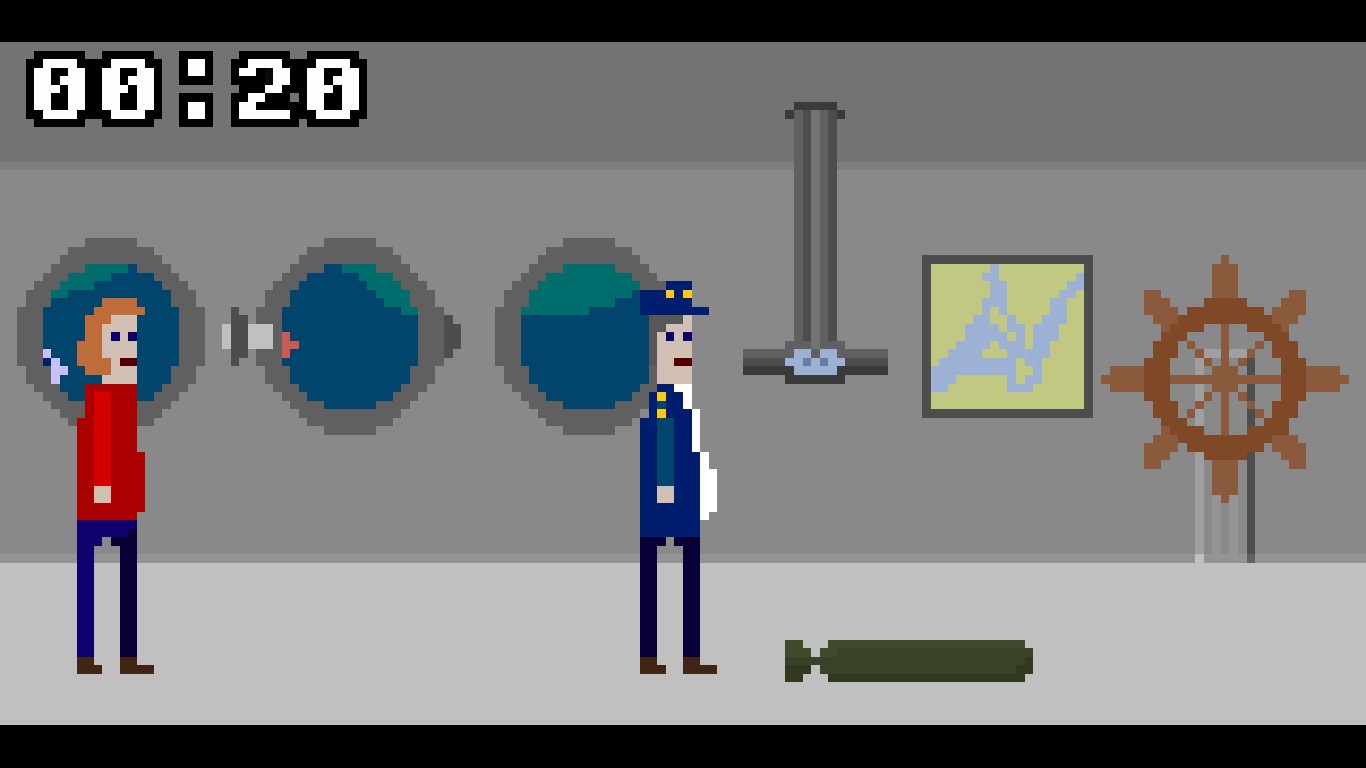 The controls of the game are very simple–a 20-second timer is counting down, but you have plenty of time to try something, anything, which you do by clicking on objects in the scene. In many cases the bomb is not even visible so you don’t always even have a clear objective, but your path is the same–try clicking on everything.
The controls of the game are very simple–a 20-second timer is counting down, but you have plenty of time to try something, anything, which you do by clicking on objects in the scene. In many cases the bomb is not even visible so you don’t always even have a clear objective, but your path is the same–try clicking on everything.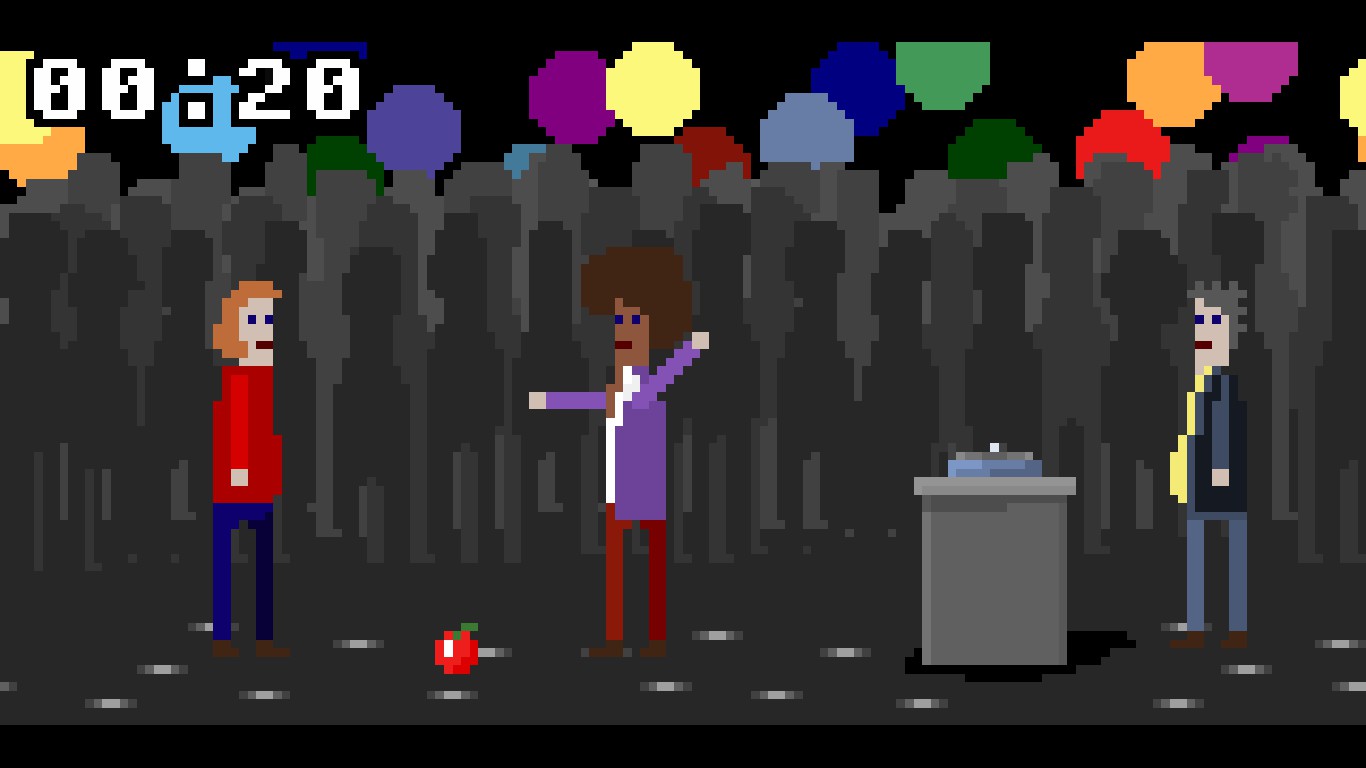 Visuals
Visuals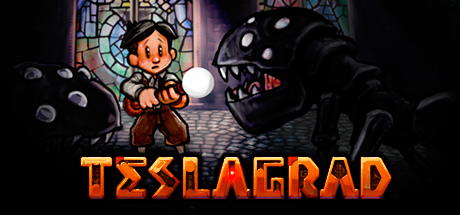 A man walks through the night, carrying a staff and a baby. He knocks on a door, gives the baby to a woman there, and then keeps walking. The baby becomes a man, and henchmen come pounding on the door. The boy flees the men through the night, eventually finding refuge in the mysterious and deadly Tesla Tower.
A man walks through the night, carrying a staff and a baby. He knocks on a door, gives the baby to a woman there, and then keeps walking. The baby becomes a man, and henchmen come pounding on the door. The boy flees the men through the night, eventually finding refuge in the mysterious and deadly Tesla Tower.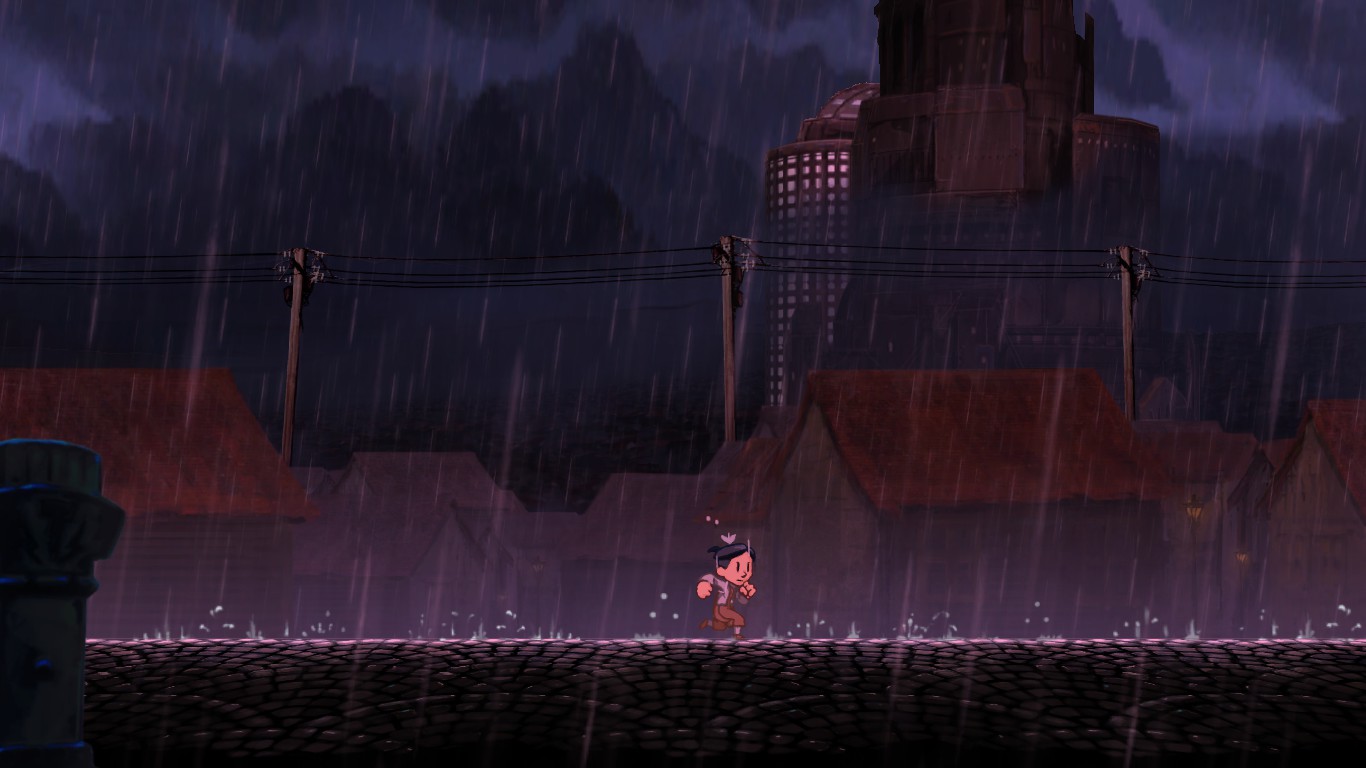
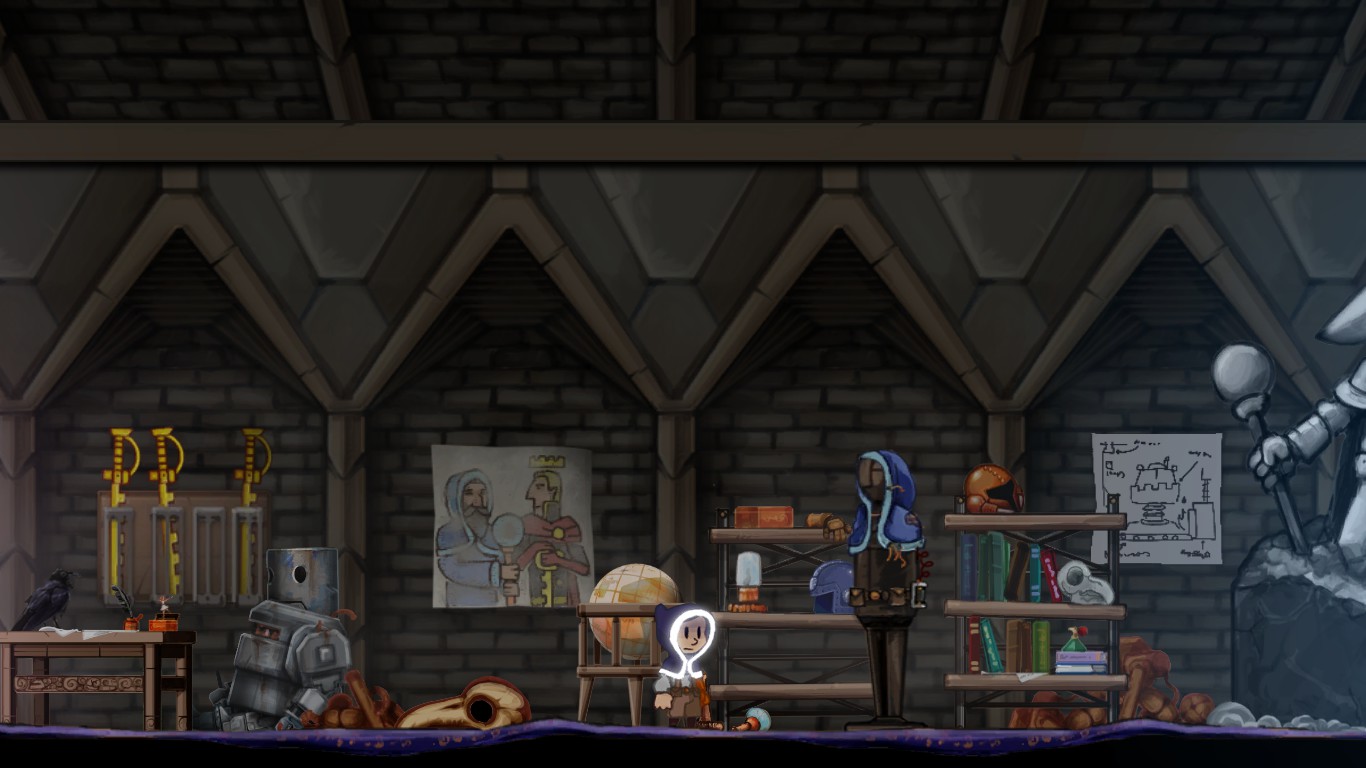 If you die you just restart in the room where you died, so there isn’t a big penalty for meeting your death–which is good because some of the puzzles are very challenging and it would be very frustrating if dying did have more of a penalty.
If you die you just restart in the room where you died, so there isn’t a big penalty for meeting your death–which is good because some of the puzzles are very challenging and it would be very frustrating if dying did have more of a penalty.
